- Home
- Patrick Rothfuss
The Name of the Wind tkc-1 Page 8
The Name of the Wind tkc-1 Read online
Page 8
Though it was always fun to watch Trip work, most of my attention was on a wagon that had rolled into the other end of town about a quarter hour ago. The mayor had argued with the old man driving it, then stormed off. Now I saw the mayor heading back to the wagon accompanied by a tall fellow carrying a long cudgel, the constable unless I missed my guess.
My curiosity got the best of me and I made my way toward the wagon, doing my best to stay out of sight. The mayor and the old man were arguing again by the time I got close enough to hear. The constable stood nearby, looking irritated and anxious.
“… told you. I don’t have a license. I don’t need a license. Does a peddler need a license? Does a tinker need a license?”
“You’re not a tinker,” the mayor said. “Don’t try to pass yourself off as one.”
“I’m not trying to pass myself off as anything,” the old man snapped. “I’m a tinker and a peddler, and I’m more than both. I’m an arcanist, you great dithering heap of idiot.”
“My point exactly,” the mayor said doggedly. “We’re God-fearing people in these parts. We don’t want any meddling with dark things better left alone. We don’t want the trouble your kind can bring.”
“My kind?” the old man said. “What do you know about my kind? There probably hasn’t been an arcanist through these parts in fifty years.”
“We like it that way. Just turn around and go back the way you came.”
“Like hell if I’m spending a night in the rain because of your thick head,” the old man said hotly. “I don’t need your permission to rent a room or do business in the street. Now get away from me or I’ll show you firsthand what sort of trouble my kind can be.”
Fear flashed across the mayor’s face before it was overwhelmed by outrage. He gestured over one shoulder at the constable. “Then you’ll spend the night in jail for vagrancy and threatening behavior. We’ll let you on your way in the morning if you’ve learned to keep a civil tongue in your head.” The constable advanced on the wagon, his cudgel held cautiously at his side.
The old man stood his ground and raised one hand. A deep, red light welled up from the front corners of his wagon. “That’s far enough,” he said ominously. “Things could get ugly otherwise.”
After a moment’s surprise, I realized the strange light came from a pair of sympathy lamps the old man had mounted on his wagon. I had seen one before, in Lord Greyfallow’s library. They were brighter than gaslight, steadier than candles or lamps, and lasted nearly forever. They were also terribly expensive. I was willing to bet that no one in this little town had ever heard of them, let alone seen one.
The constable stopped in his tracks when the light began to swell. But when nothing else seemed to happen, he set his jaw and kept walking toward the wagon.
The old man’s expression grew anxious. “Now hold on a moment,” he said as the red light from the wagon started to fade. “We don’t want …”
“Shut your clepper, you old shit-fire,” the constable said. He snatched at the arcanist’s arm as if he were sticking his hand into an oven. Then, when nothing happened, he smiled and grew more confident. “Don’t think I won’t knock you a good one to keep you from working any more of your devilry.”
“Well done, Tom,” the mayor said, radiating relief. “Bring him along and we’ll send someone back for the wagon.”
The constable grinned and twisted the old man’s arm. The arcanist bent at the waist and gasped a short, painful breath.
From where I hid, I saw the arcanist’s face change from anxious, to pained, to angry all in a second. I saw his mouth move.
A furious gust of wind came out of nowhere, as if a storm had suddenly burst with no warning. The wind struck the old man’s wagon and it tipped onto two wheels before slamming back down onto four. The constable staggered and fell as if he had been struck by the hand of God. Even where I hid nearly thirty feet away the wind was so strong that I was forced to take a step forward, as if I’d been pushed roughly from behind.
“Begone!” the old man shouted angrily. “Trouble me no longer! I will set fire to your blood and fill you with a fear like ice and iron!” There was something familiar about his words, but I couldn’t put my finger on it.
Both the mayor and the constable turned tail and ran, their eyes white and wild as startled horses’.
The wind faded as quickly as it had come. The whole sudden burst couldn’t have lasted more than five seconds. As most of the townsfolk were gathered around the public house, I doubted anyone had seen it except for me, the mayor, the constable, and the old man’s donkeys who stood placidly in their harness, utterly unperturbed.
“Leave this place clean of your foul presence,” the arcanist muttered to himself as he watched them go. “By the power of my name I command it to be so.”
I finally realized why his words seemed so familiar. He was quoting lines from the exorcism scene in Daeonica. Not many folk knew that play.
The old man turned back to his wagon and began to extemporize. “I’ll turn you into butter on a summer day. I’ll turn you into a poet with the soul of a priest. I’ll fill you with lemon custard and push you out a window.” He spat. “Bastards.”
His irritation seemed to leave him and he heaved a great, weary sigh. “Well, that couldn’t have gone much worse,” the old man muttered as he rubbed at the shoulder of the arm the constable had twisted. “Do you think they’ll come back with a mob behind them?”
For a second I thought the old man was talking to me. Then I realized the truth. He was talking to his donkeys.
“I don’t think so either,” he said to them. “But I’ve been wrong before. Let’s stay near the edge of town and have a look at the last of the oats, shall we?”
He clambered up into the back of the wagon and came down with a wide bucket and a nearly empty burlap sack. He upended the sack into the bucket and seemed disheartened by the results. He took out a handful for himself before nudging the bucket toward the donkeys with his foot. “Don’t give me that look,” he said to them. “It’s short rations all around. Besides, you can graze.” He petted one donkey while he ate his handful of rough oats, stopping occasionally to spit out a husk.
It struck me as very sad, this old man all alone on the road with no one to talk to but his donkeys. It’s hard for us Edema Ruh, but at least we had each other. This man had no one.
“We’ve wandered too far from civilization, boys. The folk that need me don’t trust me, and the ones that trust me can’t afford me.” The old man peered into his purse. “We’ve got a penny and a half, so our options are limited. Do we want to be wet tonight or hungry tomorrow? We’re not going to do any business, so it will probably be one or the other.”
I slunk around the edge of the building until I could see what was written on the side of the old man’s wagon. It read:
ABENTHY: ARCANIST EXTRAORDINARY.
Scribe. Dowser. Chemist. Dentist.
Rare Goods. All Alements Tended.
Lost Items Found. Anything Mended.
No Horoscopes. No Love Potions. No Malefaction.
Abenthy noticed me as soon as I stepped out from behind the building where I’d been hiding. “Hello there. Can I help you?”
“You’ve misspelled ‘ailments’,” I pointed out.
He looked surprised. “It’s a joke, actually,” he explained. “I brew a bit.”
“Oh. Ale,” I said, nodding. “I get it.” I brought my hand out of my pocket. “Can you sell me anything for a penny?”
He seemed stuck between amusement and curiosity. “What are you looking for?”
“I’d like some lacillium.” We had performed Farien the Fair a dozen times in the last month, and it had filled my young mind with intrigue and assassination.
“Are you expecting someone to poison you?” he said, somewhat taken aback.
“Not really. But it seems to me that if you wait around until you know you need an antidote, it’s probably too late to pick one up.”
>
“I suppose I could sell you a penny’s worth,” he said. “That would be about a dose for a person your size. But it’s dangerous stuff in its own right. It only cures certain poisons. You can hurt yourself if you take it at the wrong time.”
“Oh,” I said. “I didn’t know that.” In the play it was touted as an infallible cure-all.
Abenthy tapped his lips thoughtfully. “Can you answer me a question in the meantime?” I nodded. “Whose troupe is that?”
“In a way it’s mine,” I said. “But in another way, it’s my father’s because he runs the show and points which way the wagons go. But it’s Baron Greyfallow’s too, because he’s our patron. We’re Lord Greyfallow’s Men.”
The old man gave me an amused look. “I’ve heard of you. Good troupe. Good reputation.”
I nodded, not seeing any point in false modesty.
“Do you think your father might be interested in taking on any help?” he asked. “I don’t claim to be much of an actor, but I’m handy to have around. I could make you face paint and rouge that aren’t all full of lead and mercury and arsenic. I can do lights, too, quick, clean, and bright. Different colors if you want them.”
I didn’t have to think too hard about it; candles were expensive and vulnerable to drafts, torches were dirty and dangerous. And everyone in the troupe learned the dangers of cosmetics at an early age. It was hard to become an old, seasoned trouper when you painted poison on yourself every third day and ended up raving mad by the time you were twenty-five.
“I may be overstepping myself a little,” I said as I held out my hand for him to shake. “But let me be the first to welcome you to the troupe.”
If this is to be a full and honest account of my life and deeds, I feel I should mention that my reasons for inviting Ben into our troupe were not entirely altruistic. It’s true that quality cosmetics and clean lights were a welcome addition to our troupe. It’s also true that I’d felt sorry for the old man alone on the road.
But underneath it all I was moved by my curiosity. I had seen Abenthy do something I could not explain, something strange and wonderful. Not his trick with the sympathy lamps—I recognized that for what it was: showmanship, a bluff to impress ignorant townsfolk.
What he had done afterward was different. He called the wind and the wind came. It was magic. Real magic. The sort of magic I’d heard about in stories of Taborlin the Great. The sort of magic I hadn’t believed in since I was six. Now I didn’t know what to believe.
So I invited him into our troupe, hoping to find answers to my questions. Though I didn’t know it at the time, I was looking for the name of the wind.
CHAPTER NINE
Riding in the Wagon with Ben
Abenthy was the first arcanist I ever met, a strange, exciting figure to a young boy. He was knowledgeable in all the sciences: botany, astronomy, psychology, anatomy, alchemy, geology, chemistry… .
He was portly, with twinkling eyes that moved quickly from one thing to another. He had a strip of dark grey hair running around the back of his head, but (and this is what I remember most about him) no eyebrows. Rather, he had them, but they were in a perpetual state of regrowing from being burned off in the course of his alchemical pursuits. It made him look surprised and quizzical all at once.
He spoke gently, laughed often, and never exercised his wit at the expense of others. He cursed like a drunken sailor with a broken leg, but only at his donkeys. They were called Alpha and Beta, and Abenthy fed them carrots and lumps of sugar when he thought no one was looking. Chemistry was his particular love, and my father said he’d never known a man to run a better still.
By his second day in our troupe I was making a habit of riding in his wagon. I would ask him questions and he would answer. Then he would ask for songs and I would pluck them out for him on a lute I borrowed from my father’s wagon.
He would even sing from time to time. He had a bright, reckless tenor that was always wandering off, looking for notes in the wrong places. More often than not he stopped and laughed at himself when it happened. He was a good man, and there was no conceit in him.
Not long after he joined our troupe, I asked Abenthy what it was like being an arcanist.
He gave me a thoughtful look. “Have you ever known an arcanist?”
“We paid one to mend a cracked axle on the road once.” I paused to think. “He was heading inland with a caravan of fish.”
Abenthy made a dismissive gesture. “No, no, boy. I’m talking about arcanists. Not some poor chill-charmer who works his way back and forth across caravan routes, trying to keep fresh meat from rotting.”
“What’s the difference?” I asked, sensing it was expected of me.
“Well,” he said. “That might take a bit of explaining… .”
“I’ve got nothing but time.”
Abenthy gave me an appraising look. I’d been waiting for it. It was the look that said, “You don’t sound as young as you look.” I hoped he’d come to grips with it fairly soon. It gets tiresome being spoken to as if you are a child, even if you happen to be one.
He took a deep breath. “Just because someone knows a trick or two doesn’t mean they’re an arcanist. They might know how to set a bone or read Eld Vintic. Maybe they even know a little sympathy. But—”
“Sympathy?” I interrupted as politely as possible.
“You’d probably call it magic,” Abenthy said reluctantly. “It’s not, really.” He shrugged. “But even knowing sympathy doesn’t make you an arcanist. A true arcanist has worked his way through the Arcanum at the University.”
At his mention of the Arcanum, I bristled with two dozen new questions. Not so many, you might think, but when you added them to the half-hundred questions I carried with me wherever I went, I was stretched nearly to bursting. Only through a severe effort of will did I remain silent, waiting for Abenthy to continue on his own.
Abenthy, however, noticed my reaction. “So, you’ve heard about the Arcanum, have you?” He seemed amused. “Tell me what you’ve heard, then.”
This small prompt was all the excuse I needed. “I heard from a boy in Temper Glen that if your arm’s cut off they can sew it back on at the University. Can they really? Some stories say Taborlin the Great went there to learn the names of all things. There’s a library with a thousand books. Are there really that many?”
He answered the last question, the others having rushed by too quickly for him to respond. “More than a thousand, actually. Ten times ten thousand books. More than that. More books than you could ever read.” Abenthy’s voice grew vaguely wistful.
More books than I could read? Somehow I doubted that.
Ben continued. “The people you see riding with caravans—charmers who keep food from spoiling, dowsers, fortune-tellers, toad eaters—aren’t real arcanists any more than all traveling performers are Edema Ruh. They might know a little alchemy, a little sympathy, a little medicine.” He shook his head. “But they’re not arcanists.
“A lot of people pretend to be. They wear robes and put on airs to take advantage of the ignorant and gullible. But here’s how you tell a true arcanist.”
Abenthy pulled a fine chain over his head and handed it to me. It was the first time I had ever seen an Arcanum guilder. It looked rather unimpressive, just a flat piece of lead with some unfamiliar writing stamped onto it.
“That is a true gilthe. Or guilder if you prefer,” Abenthy explained with some satisfaction. “It’s the only sure way to be certain of who is and who isn’t an arcanist. Your father asked to see mine before he let me ride with your troupe. It shows he’s a man of the world.” He watched me with a sly disinterest. “Uncomfortable, isn’t it?”
I gritted my teeth and nodded. My hand had gone numb as soon as I’d touched it. I was curious to study the markings on its front and back, but after the space of two breaths, my arm was numb to the shoulder, as if I had slept on it all night. I wondered if my whole body would go numb if I held it long enough.
/> I was prevented from finding out, as the wagon hit a bump and my numbed hand almost let Abenthy’s guilder fall to the footboard of the wagon. He snatched it up and slipped it back over his head, chuckling.
“How can you stand it?” I asked, trying to rub a little feeling back into my hand.
“It only feels that way to other people,” he explained. “To its owner, it’s just warm. That’s how you can tell the difference between an arcanist and someone who has a knack for finding water or guessing at the weather.”
“Trip has something like that,” I said. “He rolls sevens.”
“That’s a little different,” Abenthy laughed. “Not anything so unexplainable as a knack.” He slouched a little farther down into his seat. “Probably for the best. A couple hundred years ago, a person was good as dead if folk saw he had a knack. The Tehlins called them demon signs, and burned folk if they had them.” Abenthy’s mood seemed to have taken a downward turn.
“We had to break Trip out of jail once or twice,” I said, trying to lighten the tone of the conversation. “But no one actually tried to burn him.”
Abenthy gave a tired smile. “I suspect Trip has a pair of clever dice or an equally clever skill which probably extends to cards as well. I thank you for your timely warning, but a knack is something else entirely.”
I can’t abide being patronized. “Trip can’t cheat to save his life,” I said a little more sharply than I had intended. “And anyone in the troupe can tell good dice from bad. Trip throws sevens. It doesn’t matter whose dice he uses, he rolls sevens. If he bets on someone, they roll sevens. If he so much as bumps a table with loose dice on it, seven.”
“Hmmm.” Abenthy nodded to himself. “My apologies. That does sound like a knack. I’d be curious to see it.”
I nodded. “Take your own dice. We haven’t let him play for years.” A thought occurred to me. “It might not still work.”
He shrugged. “Knacks don’t go away so easily as that. When I was growing up in Staup, I knew a young man with a knack. Uncommonly good with plants.” Abenthy’s grin was gone as he looked off at something I couldn’t see. “His tomatoes would be red while everyone else’s vines were still climbing. His squash were bigger and sweeter, his grapes didn’t hardly have to be bottled before they started being wine.” He trailed off, his eyes far away.

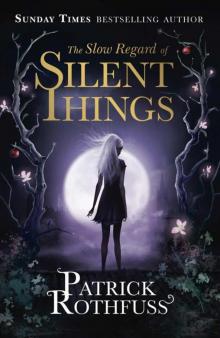 The Slow Regard of Silent Things
The Slow Regard of Silent Things The Name of the Wind
The Name of the Wind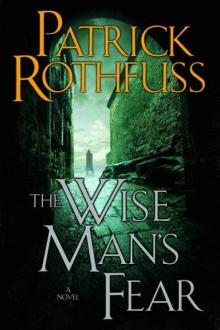 The Wise Man's Fear
The Wise Man's Fear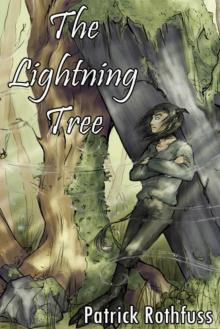 The Lightning Tree
The Lightning Tree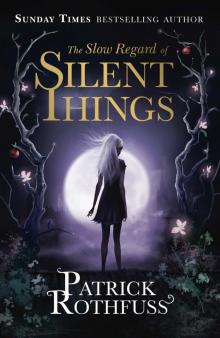 The Slow Regard of Silent Things: A Kingkiller Chronicle Novella (The Kingkiller Chronicle)
The Slow Regard of Silent Things: A Kingkiller Chronicle Novella (The Kingkiller Chronicle)![Kingkiller Chronicle [01] The Name of the Wind Read online](http://i1.bookreadfree.com/i/03/24/kingkiller_chronicle_01_the_name_of_the_wind_preview.jpg) Kingkiller Chronicle [01] The Name of the Wind
Kingkiller Chronicle [01] The Name of the Wind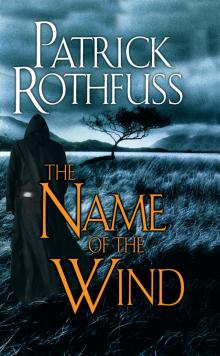 The Name of the Wind tkc-1
The Name of the Wind tkc-1